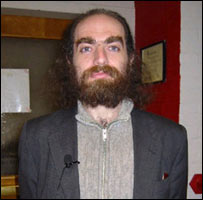Perelman - mathematician
Grigory Perelman, the Russian scientist, rejected the " Nobel Mathematical Prize ", often separating himself from the outside world and not paying attention to fame. He did not come to receive this award, and would probably refuse the $ 1 million reward for solving the Millennium Puzzle.

Grigory Perelman.(Photo: BBC)
Grigory Perelman, 40, won the Fields Prize (which is considered to be as prestigious as the Nobel Prize in other fields) thanks to his geometrical research. This work is considered to be capable of helping experts discover the universe's shape. However, according to organizers of the 25th International Math Congress in Madrid, he will not come to receive the prize.
His former colleagues in St. Petersburg, the home of the mathematician, said this is consistent with the personality of a human being who always rejects fame.
' He is very polite but quiet ,' Natalya Stepanovna, who worked with Perelman at the Steklov Mathematical Academy in St Peterburg, said. Perelman suddenly pulled out of this academy on January 1 without giving an explanation. The people working here did not see him again since then.
' Maybe he wants to be free to study ', Stepanovna speculated.
Deputy Sergei Novikov said Perelman began to learn about Poincare Conjecture, the mathematical theorem that he seemed to have found and solved the Fields award, since 1992.
' But since Perelman started showing off his eccentricities, I think he will never complete his ideas. So he completed the research, 'Novikov said. 'I tried to bring Perelman into the academy of science, giving him scholarships, but he kept refusing everything .'
In the rare photo provided by the Steklov Mathematical Institute, Perelman has blue eyes, a thick beard and bushy eyebrows.
Perelman was born on June 13, 1966 in Leningrad, the former name of St Petersburg. His math teacher - Tamara Yefimova - called him Grisha. He attended the 239 math school. According to Yefimova, Grisha is a ' smart student, good at all subjects, except sports '.
At 16, Perelman won the top prize at the International Mathematical Olympiad in Budadpest in 1982 with an absolute score.
' Math is always the most important thing for me. But I can't say you're a self-contained or eccentric person. That's not right. Grisha has friends and plays violin ', Yefimova said. ' I understand why you don't want to meet journalists. Grisha is an erudite person, only interested in the truth, not like the talk about it . '
Perelman completed his doctorate in mathematics, specializing in geometry studying the shape of objects in space. He then taught at American universities, including Massachusetts Institute of Technology, and then returned to Russia in the mid-1990s.
 (Photo: telegraph.co.uk) In 1996, Perelman won the prize at the second European Mathematical Congress in Budapest. He refused this award, because the judges were not qualified.
(Photo: telegraph.co.uk) In 1996, Perelman won the prize at the second European Mathematical Congress in Budapest. He refused this award, because the judges were not qualified.
Real reputation came to Perelman in 2002 and 2003 when he published on the Internet two studies of the Pointcare Conjecture theorem . This puzzle caused mathematicians to give up since Henri Pointcare, a Frenchman, launched in 1904. In about 61 pages of his handwritten notes, Perelman seems to have proved the theorem, but he has not yet given a Works fully in scientific journals.
This is also the Millennium Puzzle that the Clay Mathematics Academy once promised to win a $ 1 million prize for anyone to solve it. Perelman did not care about receiving this money.
Currently the genius of mathematics is said to be living with his mother in St Petersburg. Calls to Perelman phone numbers registered in the contacts are not answered. The acquaintances refused to provide his contact number or address, explaining that he did not want to talk to the press.
A former colleague, Yevgeny Damaskinsky, commented that Perelman ' is a very introverted person ' who doesn't care about money but only thinks about research. ' Sometimes he seems a bit crazy, but it's a quality that all talented mathematicians have .'
MC
- Vietnamese scientists talk about Perelman phenomenon
- The math genius rejected the prestigious awards
- Why does the Russian genius of mathematics refuse $ 1 million?
- Romanian mathematician uses a secret formula to win the lottery 14 times
- We are all born with the mathematician's brain, whether you realize it or not
- A mathematician just solved the 160-year-old problem worth $ 1 million
- Can we become mathematicians by way of self-study? (Part 3)
- Russian scientists decipher the message of aliens
- Abel and the Abel Prize
- The first female owner of the Fields award
- Math thinking
- Mathematician Canada Langlands was awarded the Abel Math Prize 2018
 The most famous scientific failures in history
The most famous scientific failures in history Mysterious genius mechanic and the machine froze time
Mysterious genius mechanic and the machine froze time The son carries the 'bad gene' of genius Albert Einstein
The son carries the 'bad gene' of genius Albert Einstein Isaac Newton
Isaac Newton